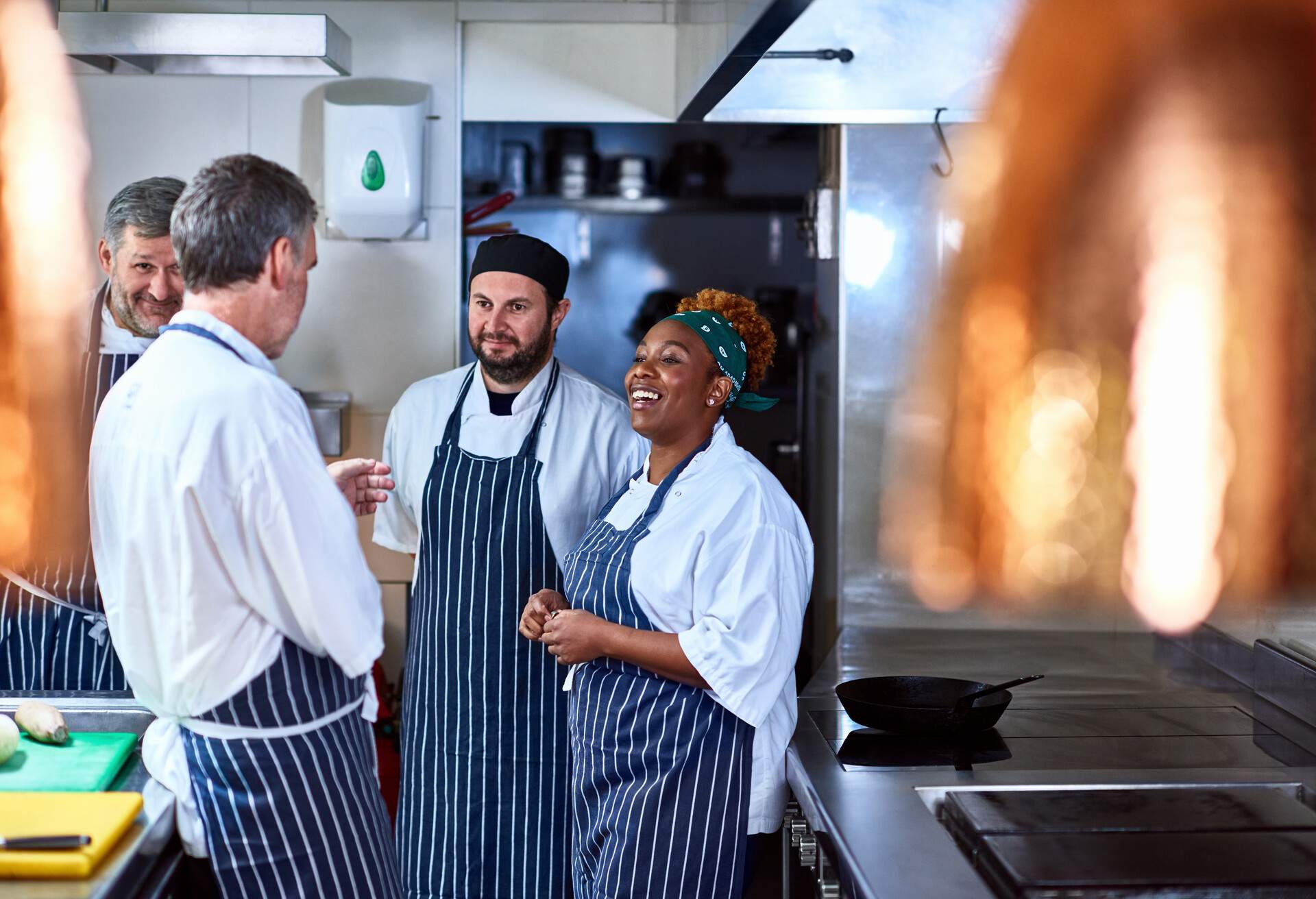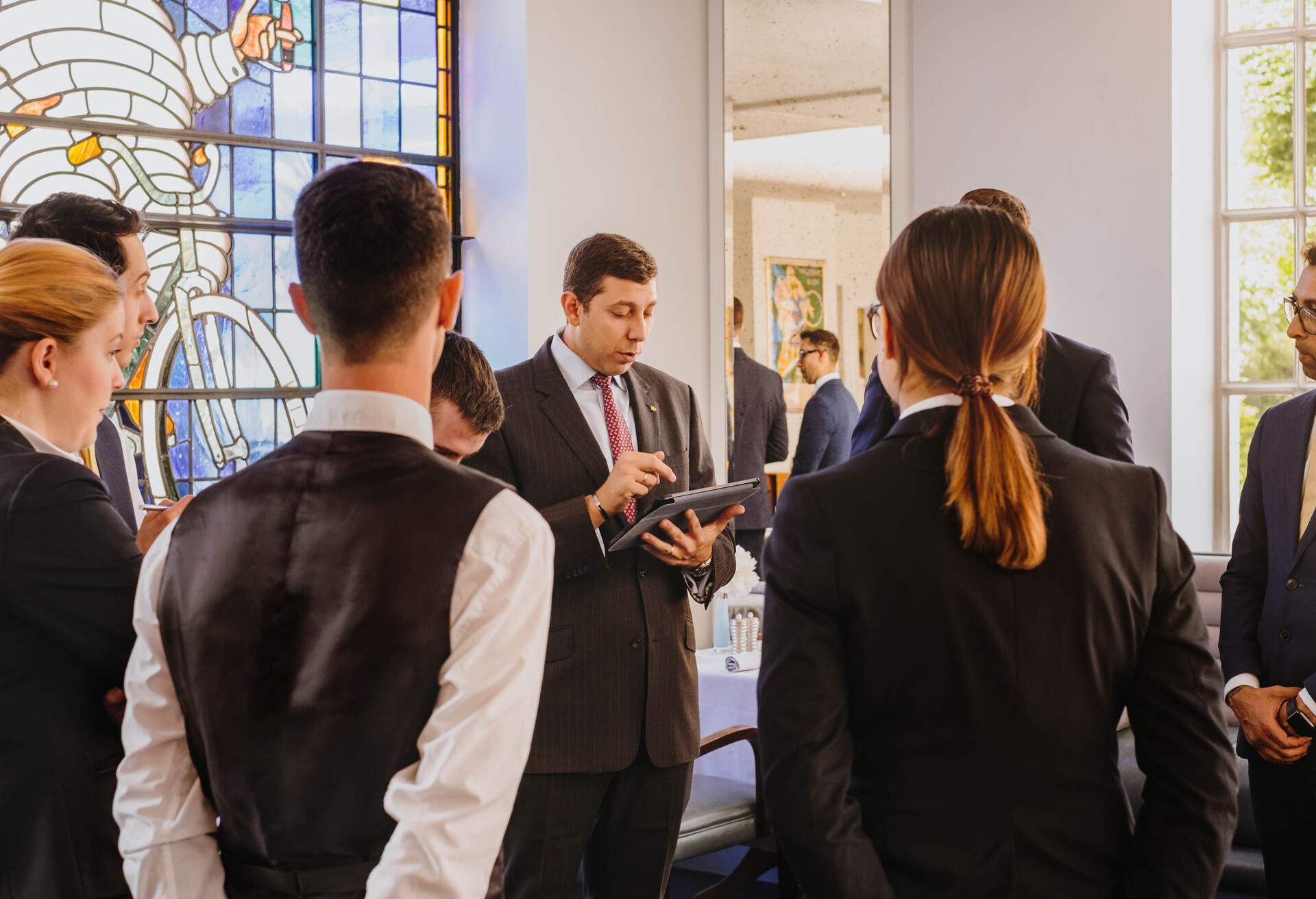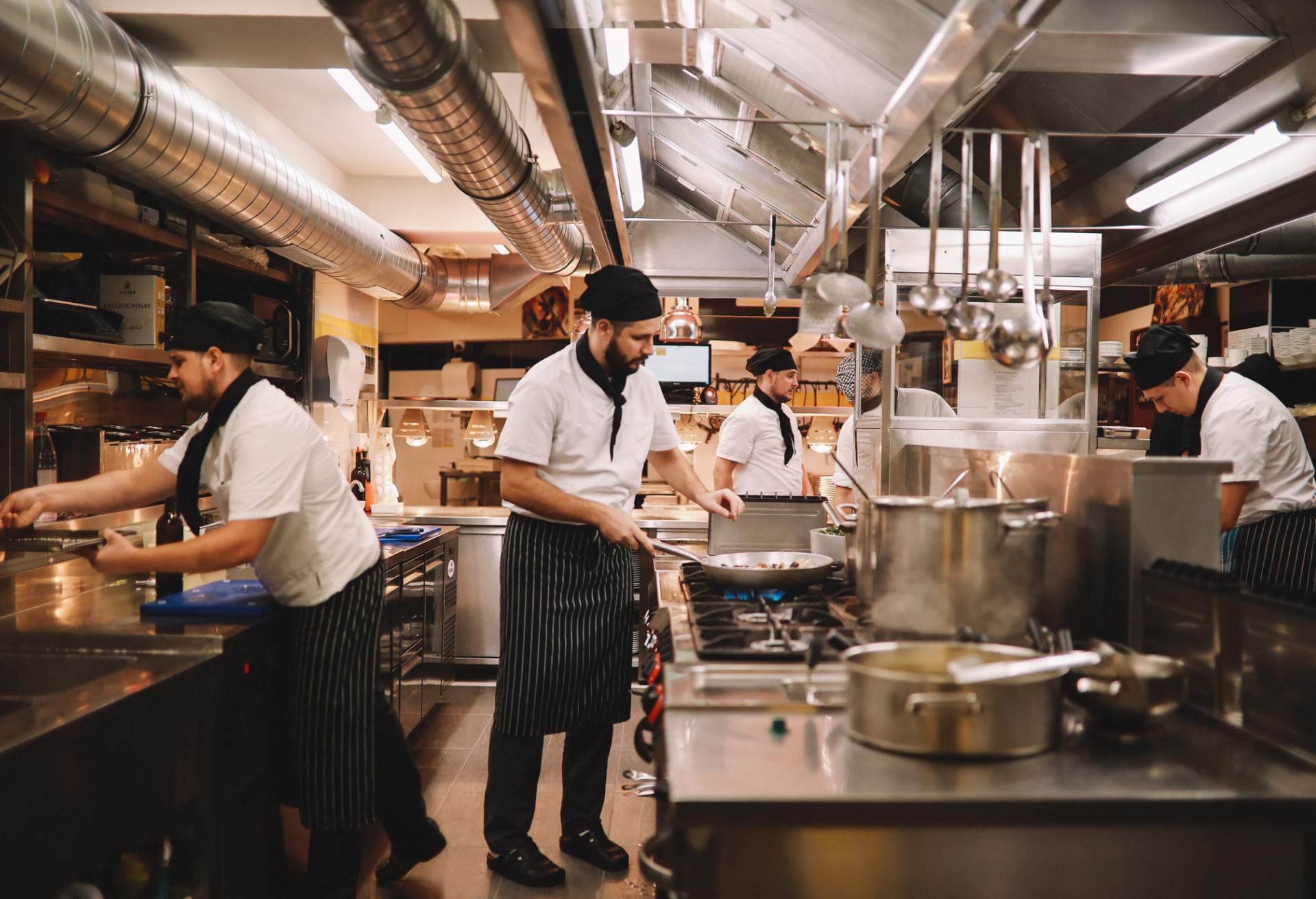Aspiring towards restaurant management? The path forward takes many forms. Whether general managers directing operations, restaurant managers spearheading the front of house, kitchen managers leading the back of house team, or bar managers in charge of drinks and service, a breadth of managerial roles exist, each with varying duties, requirements and rewards.
This guide outlines the key distinctions between these all-important positions so you can decide which role best suits your talents and ambitions.
- General manager
- Restaurant manager
- Kitchen manager
- Bar manager
Different restaurant manager roles
There are a fair few restaurant manager roles, all of which come with their own responsibilities and requirements. Here’s a breakdown of each one, including general job descriptions, pay and daily duties.
General manager
As the authoritative leader directing all restaurant operations, the general manager (GM) role carries lofty responsibilities. But for those with a passion for the hospitality industry and strong business acumen, it offers equally substantial personal and professional rewards. Let’s explore the requirements to be a successful GM.
Main responsibilities
Simply put, the buck stops with the GM. As chief steward of the restaurant, their core duty is to guarantee smooth operations across all areas — from the temperamental artists in the kitchen to the guests in the dining room. This role requires mastering a diverse range of capabilities.
Daily and weekly tasks
No two days are alike as the GM needs to seamlessly toggle between emerging issues and long-term planning while keeping staff motivated and standards high. One day they’re conducting job interviews to fill a vacant server role. The next day, they’re acting as peacemakers with the head chef amid a kitchen clash over plating arrangements.
Technical Expertise
An understanding of finance and regulation is a prerequisite for controlling budgets and adhering to codes of practice. Experience with reservation platforms like OpenTable, POS systems and payroll programs is handy for keeping covers flowing and handling staff schedules. An analytical mindset also helps when it comes to making data-driven decisions.
Soft skills
A nurturing spirit and a talent for sharp communication help restaurant managers lead a team, resolve conflicts and deliver exceptional customer service. Being able to keep organised and manage time wisely is also fundamental for operations and helps with high workplace morale. Meeting the daily challenges of this lively industry requires patience, compassion and the ability to adapt.
Salary range
Annual salaries for the GM range from £35,000 to £41,000-plus, according to job website Glassdoor, with six-figure incomes at some luxury, high-end establishments achievable.
Factors impacting pay
Larger venues and well-known brands typically offer higher salaries. If you have years as an assistant GM or an advanced hospitality degree, it may be easier to increase your salary. But most importantly, dedication to the role is what really pays off.
The GM
The general manager role is demanding yet rewarding, requiring business acumen, people skills, technical prowess and unwavering dedication. Successful GMs lead with compassion, nurture talent, resolve conflicts and ensure smooth operations, all for the love of hospitality.
More information:
Learn about the different types of restaurant terms.

Restaurant manager
The bustling dining room is the playground of the restaurant manager. Leading the front-of-house staff to deliver exceptional hospitality, their duties form the very face and personality of the restaurant. Success requires equal parts charm, composure and organisation.
Main responsibilities
The restaurant manager is the steward of the dining room and its staff. Core duties include overseeing server teams for seamless guest experiences, handling reservations and staffing and enforcing safety and conduct policies.
Daily and weekly tasks
On a daily basis, a manager will:
- Monitor the quality and service
- Address customer issues
- Check inventory and orders
- Review staff performance
- Ensure facilities are clean and step in to help wherever needed.
For weekly tasks, they may
- Create staff schedules
- Track and analyse sales data
- Conduct team meetings on improvements
- Manage payroll and organise shipments and reservations.
Being a restaurant manager means you’ll wear many hats.
Technical expertise
A restaurant manager needs a strong grasp of everything from inventory systems and payroll platforms to scheduling software and point-of-sale technologies so they can oversee behind-the-scenes operations. Being comfortable with these back-end restaurant technologies makes it easier to respond to what the business requires and keep things running smoothly for diners.
Soft skills
Connecting with staff and guests requires excellent communication and empathy. Staying calm under pressure leads to clear decision-making in the heat of busy periods. And keeping an upbeat attitude while working long hours goes a long way toward leading a positive team.
Salary range
According to job website Reed.co.uk, the average salary for a restaurant manager is £32,000 to £38,000 per annum.
Factors impacting pay
A manager’s experience level, as well as past performance record and specific qualifications impact pay rates set by restaurant owners. Additionally, the establishment’s location, size, prestige and budget determine salaries and signing bonus potential.
The restaurant manager
As the face of hospitality, restaurant managers charm guests while orchestrating behind-the-scenes action. Requiring equal parts composure, empathy and organisation, success comes from keeping staff upbeat and operations running amid the controlled chaos of the dining room.
What’s the difference between a general manager and a restaurant manager?
Restaurant general managers and restaurant managers both oversee day-to-day operations, but the position scope and responsibilities differ.
Typically, the general manager is the highest-ranking staff member at an individual restaurant location and is in charge of the entire diner and business strategy, including long-term planning and budgeting.
Restaurant managers, on the other hand, carry out the GM’s vision, managing shifts, logistics, staff, costs and revenue generation for just one part of the day or week. The roles are differentiated by seniority and scale of decision-making.
Kitchen manager
The heartbeat of the restaurant emanates from the kitchen, where the kitchen manager conducts their team of chefs with finesse, passion and diligence. Their role blends creativity, strict operational precision and steadfast leadership under pressure.
Main responsibilities
Also known as a head chef, the kitchen manager oversees all back-of-house operations. They must lead staff in
- Preparing menus
- Upholding quality standards
- Controlling budgets and inventory
- Enforcing safety and cleanliness protocols
- Coordinating with front-of-house teams and having a plan if short of staff
- Optimising operational efficiency.
Daily and weekly tasks
Kitchen managers oversee all back-of-house operations, from monitoring food inventory and placing supply orders to managing budgets and labour costs. Some tasks include making sure food preparation meets quality standards, training and coaching kitchen staff, creating employee schedules and enforcing safety and sanitation protocols.
Technical expertise
Blending the creativity of a culinary artist with the analytical skill of a scientist, kitchen managers must have mastery over diverse cooking techniques, global cuisines, dietary restrictions and presentation methods. Beyond that, they also adhere to strict health codes and are on top of inventory so the kitchen never runs out of ingredients.
Soft skills
A kitchen manager must exude unwavering leadership, projecting confidence and vision while also understanding each chef’s abilities and passions. During high-stakes busy periods, the kitchen manager needs to channel stress in a creative way that translates into a tightly-knit kitchen where disputes are settled through empathy. Finally, kitchen managers coach junior chefs through continuous feedback and encouragement, mentoring future stars.
Salary range
Salary ranges for a kitchen manager vary depending on location. In larger cities like London and Edinburgh, the average salary is around £33,500 per year, according to job-seeking website Indeed.
Factors impacting pay
- Location. Kitchen manager salaries must account for varying local costs of living and regional food costs. Fine dining in London commands larger salaries than in small-town spots.
- Restaurant reputation. Work experience at Michelin-rated establishments or with celebrity chefs brings with it salary perks at future jobs. Name-brand kitchens also increase pay.
- Team oversight. Larger kitchen staff counts require greater management responsibilities, increasing compensation offers.
- Performance results. Bonus clauses reward kitchen managers for metrics like diner satisfaction, cost savings and sales growth markers.
The kitchen manager
At the helm of the kitchen, managers blend artistry with steadfast leadership, upholding quality standards while mentoring rising chefs. Requiring equal parts passion, diligence and unwavering vision under pressure, success comes from keeping operations precise amid the heat of the kitchen.

Bar manager
The heartbeat of a restaurant’s convivial energy flows through the bar, where the resident mixologist must combine precision measurements with insightful guest connections. As bar manager, you oversee the crafting and service of drinks — ensuring the beer always flows frothy, wine notes never disappoint, and cocktails dazzle with showmanship. Success requires harnessing technical talents with interpersonal flair.
Main responsibilities
As head bartender directing back-of-house beverage operations, the bar manager’s core duties include:
- Managing inventory to forecast demand
- Curating wine, beer and cocktail menus
- Training bartenders and barbacks in preparation techniques
- Enforcing safety protocols
- Spearheading mixer recipe development
- Coordinating with restaurant leadership
- Reporting to the GM or owners.
They simultaneously handle customer interactions at their own bar station when needed.
Daily and weekly tasks
Daily, bar managers directly oversee staff performance, such as monitoring pour accuracy, enforcing safety protocols, and restocking supplies while also stepping behind the counter to prepare signature cocktails. Weekly tasks involve higher-level planning, like placing inventory orders based on consumption analysis, changing menus from customer feedback, drafting staff schedules and providing training.
Technical expertise
Extensive knowledge of drinks and mixology techniques is mandatory for a bar manager. Having inventory management skills also means you can forecast demand. Then there’s the tech side, with an understanding of the restaurant’s technology stack necessary to be aligned with restaurant operations.
Soft skills
A bar manager’s greatest talent remains engaging guests through hospitality showmanship, driving loyalty by making diners feel important while guiding them to new discoveries that brighten their nights. Expert listening skills mean you’ll be right on the nose for a guest’s pouring preferences, while a sharp memory helps recall previous orders and special occasions.
Salary range
Glassdoor reports that bar managers can expect to make between £28,000 and £35,000 per year in their role. Again, factors like location play a significant role in pay scales. London, for example, has an average bar manager wage closer to £40,000.
Factors impacting pay
Bar managers earn more at busier places because they need to oversee more. Being able to create unique drinks and managing a team across several bars also leads to higher pay opportunities.
The bar manager
As chief mixologist and conviviality conductor, bar managers oversee inventory, concoct cocktails and forge guest connections with hospitality flair. Requiring technical mastery and interpersonal charm, success comes from harnessing precision measurements with insightful guest interactions to keep the drinks flowing.
More information:
See what it takes to hire the best staff at a restaurant
Summary: Becoming a restaurant manager
Whether you have your sights set on leading the show as general manager or prefer supporting players like bar or kitchen oversight, diverse management paths await in the hospitality sector. Unlocking your growth potential requires first understanding the nuanced duties and expertise needed to excel across these varied leadership roles that keep dining establishments humming.




